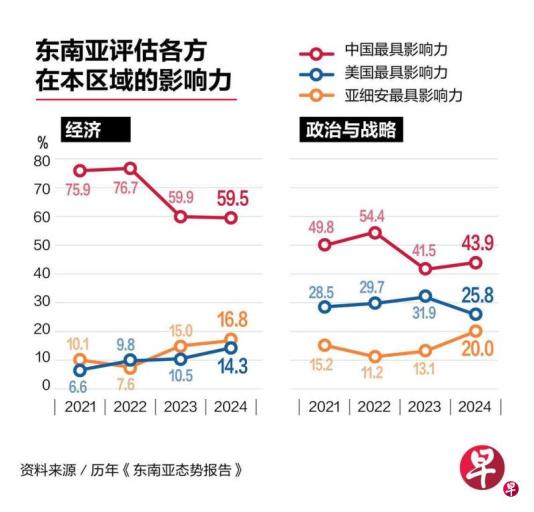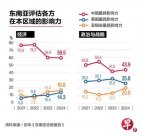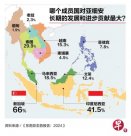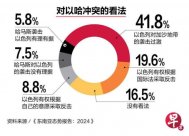
China continues to have the greatest influence on regional economy and politics and strategy, but with the rise in China's influence, the concerns of interviewees have continued to rise.Ke Chengxing, dean of the School of Public Policy, Li Guangyao, described that Southeast Asia's concern for China's influence was "extremely high"; interviewees acknowledged that China's influence did not mean accepting China's influence.
The Southeast Asian Situation Report released by the Iseas Research Center of the Yosov Isa Eastern South Asia (ISEAS) Asia Simpan Research Center in Singapore: 2024 shows that as many as 59.5%of the respondents believe that China has the largest influence on regional economic influence on regional economic influenceIt is believed that the ratio of China's most influence on regional politics and strategic fields also reached 43.9%, far exceeding the United States and Asians.
However, in the face of China's weak economy, China's economic influence continues the decline of last year, and this year fell by 0.4 percentage points.
The economic influence of the United States has maintained a slight upward trend since the entry of the government in 2021.This year, the ratio of the United States with the most economic influence in the region has further increased from 10.5 % to 14.3 %.
But in the context of the continued intensification of geopolitical games in China and the United States, the concerns of interviewees' influence on China and the United States have increased significantly.Those who expressed concerns about China's economic and political and strategic influence reached 67.4%and 73.5%, which was much higher than 32.6%and 26.5%of the welcome.
The ratio of concerns to worry about US politics and strategic influence also increased from 44.2 % last year to 59 %; although the concerns of the U.S. economic influence also increased to 48 %, there are still many welcomes.It is 52 %.
Ke Chengxing analyzed at the report conference that the interviewees pointed out that China has become the most influential economic country, which reflects reality, but "recognizing China's most influentialness does not mean accepting this influence.The same is true in the United States. "
Southeast Asian people's concerns about the United States are believed to be influenced by the actions of the United States in recent years, especially the industrial policy of the United States, shaken Asians' views on US values and the rule of law.Ke Chengxing said: "The principles of industrial policy promoted in the United States are not clear ... People worry that the United States' implementation of industrial policies is not for their own progress, but to defeat others."
More than 50 % are optimistic about the relationship with China will improve
Southeast Asian interviewees are optimistic about the prospects of relations with China as a whole. They believe that the relationship between the relationship with China in the next three years will improve from 38.7 % last year to more than 50 %.
But in the face of the sovereignty dispute between China and the Philippines in the South China Sea, the interviewees are still vigilant in China.Among the respondents who were optimistic about the prospects, 38.5 % and 37.2 % believed that China ’s increasing economic dominance and political influence in Southeast Asian countries, as well as tough wrists in the South China Sea and the Mekong River may have declined China’ s image.
Among the respondents who are not optimistic about their national and Chinese relations prospects, 67 % of them believe that China must resolve sovereignty disputes in accordance with international law, and they can change China.
Ke Chengxing said: "China is a bit bullied by its scale and self -confidence. It is a person who bullies people on the sovereignty of the South China Sea and uses economic strength to bully his foreign policy."
But Ke Chengxing emphasized that although China is a bully, it does not seek to subvert the economic and political system of other countries.However, how to deal with this big bully is something that Asians must solve, and Washington must also maintain communication with China to solve problems.
Wu Xinbo, Dean of the Fudan University International Issues Research Institute attending the same forum, believes that China should continue to strengthen political mutual trust with Asianan through promoting mutual economic cooperation. More importantly, it is necessary to control the South China Sea dispute.
He said: "This is not only a maritime dispute, but also about the long -term cooperative relationship between China and the region. Many regional countries regard the South China Sea issue as a test of China's strategic intent."




